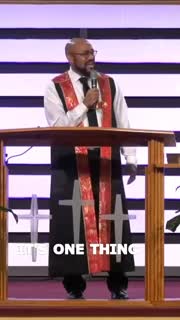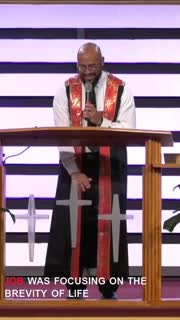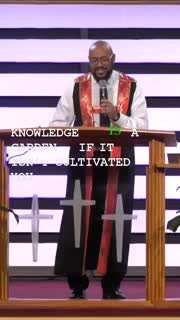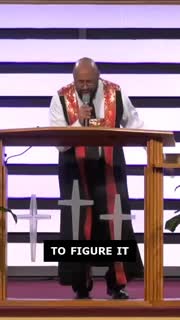Job's Suffering: The Need for Compassion and Mediation
Devotional
Sermon Summary
Bible Study Guide
Sermon Clips
1. "It's one thing to be going through. It's another thing not to even understand why you're going through what you're going through. How is it that I was doing everything right and ended up worse off than others who knowingly commit wickedness? How is it? I didn't cheat. I didn't lie. I didn't steal, but I still didn't get the job. Well, I see other people do all that, and they become president of the United States. Why are bad things happening to me when I'm living righteously?" [04:03] (44 seconds)
2. "Job was focusing on the brevity of life and saying to God, I feel like I'm running out of time. Job closed his appeal in chapter seven by asking for forgiveness for anything that he has done that he's not aware of that would cause his current circumstance and predicament. That begs us to question that if today was your last day, would you be satisfied with the life you've lived? Would you be content with the service you've given, the relationships you've built, the spiritual walk that you have exhibited?" [10:16] (50 seconds)
3. "Stop trying to preach to me when you haven't walked with me when you can't relate or at least have compassion for my struggle you can't speak to my pain if I'm hungry give me a piece of chicken if if I'm naked give me a hoodie to put on if I'm sick come bring me some me just a little while remember that I exist we misrepresent our Lord because we want to always preach a sermon and force people to where we are when we forget to preach a sermon." [14:04] (53 seconds)
4. "Jesus stood up for her when others were trying to condemn her Jesus stooped down and stood up just to make sure that she was protected now understand what this means back to the attributes of God you've got to see it they all depart and jesus says to her where are your accusers didn't even one of them condemn you she says no lord she see that's love jesus steps in and fights your battles shows up to defend you even sometimes when you were wrong it's not that she was right it's just that god still loved her." [21:07] (52 seconds)
5. "God's grace is not a license to live and do however we feel in each moment. No, his grace meets us where we are to transform us into all God has purposed us to be. Grace without justice is a license to live unjustly and justice without grace is, has no restorative component to it. It is simply just judgment. Bildad does not understand God's grace." [22:56] (26 seconds)
6. "Knowledge is a garden if it isn't cultivated you can't harvest it can we can we hear the wisdom of the ancestors for a moment knowledge we agree is power right just like a garden what you know and learn must be cultivated in the most beautiful of gardens weeds still grow up don't they pests still invade deer still show up to feast with the rabbits and the other animals and the garden's productivity is tied not just to the nutrients in the soil or the rain but to how the cultivation of the plants is going one must be able to grow in order to receive a harvest." [27:57] (60 seconds)
7. "The past must be a rudder to guide us and not an anchor to hold us back. Many are stuck in the past instead of being informed by the past. Let me break it down the way the late historian Yaroslav Pelikan put it. The way he put it was is he said there's a difference between tradition and traditionalism. He states, I quote, tradition is the living faith of the dead, but traditionalism is the dead faith of the living." [29:55] (38 seconds)
8. "If I hold God to how he moved yesterday, I'll miss how he's moving today. If I hold God to doing exactly what he did before, then I'll miss how he's gonna do it today. I don't know how he's gonna heal me this time. Last time he healed me just with a prayer, but this time he may heal me by the doctors. I don't care how he does it. What I know is at the end of the day, the tradition is I'm healed. tradition is I've been set free. The tradition is Jesus is the way, the truth, and the life." [31:28] (37 seconds)
9. "Job says, well, I wish I could have a legal trial then. Job says, I wish I could take God to court and be given an opportunity to prove my integrity and innocence. And Job goes on, but he states, how could a mere mortal bring such a case against God? He says, what chance would I have? He says, God's wisdom is so deep. God's power is so immense. Who could take him on and come out in one piece?" [34:59] (44 seconds)
10. "Job said there is no mediator who could come between him and God and lay hand on them both. You are missing this moment, Job. Job is letting us know that we are not grateful enough. Because while he was lost trying to figure it out, in the beginning of the love of God, God won't let him go. He said, he'll leave you all this please, oh, please, don't pass me by." [39:47] (60 seconds)
Ask a question about this sermon
2. "Job was focusing on the brevity of life and saying to God, I feel like I'm running out of time. Job closed his appeal in chapter seven by asking for forgiveness for anything that he has done that he's not aware of that would cause his current circumstance and predicament. That begs us to question that if today was your last day, would you be satisfied with the life you've lived? Would you be content with the service you've given, the relationships you've built, the spiritual walk that you have exhibited?" [10:16] (50 seconds)
3. "Stop trying to preach to me when you haven't walked with me when you can't relate or at least have compassion for my struggle you can't speak to my pain if I'm hungry give me a piece of chicken if if I'm naked give me a hoodie to put on if I'm sick come bring me some me just a little while remember that I exist we misrepresent our Lord because we want to always preach a sermon and force people to where we are when we forget to preach a sermon." [14:04] (53 seconds)
4. "Jesus stood up for her when others were trying to condemn her Jesus stooped down and stood up just to make sure that she was protected now understand what this means back to the attributes of God you've got to see it they all depart and jesus says to her where are your accusers didn't even one of them condemn you she says no lord she see that's love jesus steps in and fights your battles shows up to defend you even sometimes when you were wrong it's not that she was right it's just that god still loved her." [21:07] (52 seconds)
5. "God's grace is not a license to live and do however we feel in each moment. No, his grace meets us where we are to transform us into all God has purposed us to be. Grace without justice is a license to live unjustly and justice without grace is, has no restorative component to it. It is simply just judgment. Bildad does not understand God's grace." [22:56] (26 seconds)
6. "Knowledge is a garden if it isn't cultivated you can't harvest it can we can we hear the wisdom of the ancestors for a moment knowledge we agree is power right just like a garden what you know and learn must be cultivated in the most beautiful of gardens weeds still grow up don't they pests still invade deer still show up to feast with the rabbits and the other animals and the garden's productivity is tied not just to the nutrients in the soil or the rain but to how the cultivation of the plants is going one must be able to grow in order to receive a harvest." [27:57] (60 seconds)
7. "The past must be a rudder to guide us and not an anchor to hold us back. Many are stuck in the past instead of being informed by the past. Let me break it down the way the late historian Yaroslav Pelikan put it. The way he put it was is he said there's a difference between tradition and traditionalism. He states, I quote, tradition is the living faith of the dead, but traditionalism is the dead faith of the living." [29:55] (38 seconds)
8. "If I hold God to how he moved yesterday, I'll miss how he's moving today. If I hold God to doing exactly what he did before, then I'll miss how he's gonna do it today. I don't know how he's gonna heal me this time. Last time he healed me just with a prayer, but this time he may heal me by the doctors. I don't care how he does it. What I know is at the end of the day, the tradition is I'm healed. tradition is I've been set free. The tradition is Jesus is the way, the truth, and the life." [31:28] (37 seconds)
9. "Job says, well, I wish I could have a legal trial then. Job says, I wish I could take God to court and be given an opportunity to prove my integrity and innocence. And Job goes on, but he states, how could a mere mortal bring such a case against God? He says, what chance would I have? He says, God's wisdom is so deep. God's power is so immense. Who could take him on and come out in one piece?" [34:59] (44 seconds)
10. "Job said there is no mediator who could come between him and God and lay hand on them both. You are missing this moment, Job. Job is letting us know that we are not grateful enough. Because while he was lost trying to figure it out, in the beginning of the love of God, God won't let him go. He said, he'll leave you all this please, oh, please, don't pass me by." [39:47] (60 seconds)










